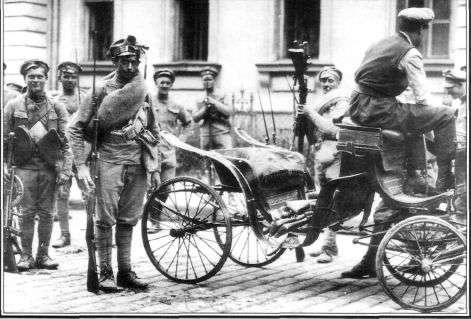A People's Tragedy (120 page)
Read A People's Tragedy Online
Authors: Orlando Figes



69 The Red Army was no match for the Czech Legion, pictured here during the capture of Vladivostok in June 1918. The aim of the Czechs was to travel eastwards to the United States, and from there return to the European war.
70 The White armies were top-heavy - too many generals and not enough soldiers. A group of White officers await the arrival of Admiral Kolchak during a military parade in Omsk, December 1918.


71 By contrast the Red forces were bottom-heavy - too many infantry and not enough commanders with expertise. The 'committee spirit' of 1917 lived on in the ranks of the Red partisan units such as Makhno's, pictured here in 1920, where tactics were decided by a show of soldiers' hands.
72 Armoured trains like this played a vital role in the civil war.


73 Part of the Red Army, the Latvian Division, passing through a village near the South-Western Front, 1919.
74 Two Red Army soldiers take a break during the fighting on the South-Western Front, 1919.


75-6 The Red Army served as an important channel for the spread of literacy and propaganda.
Above:
soldiers in Tula reading Red Army leaflets, spring 1919.
Below:
the Red Army brings its propaganda to the village. The mobile library of II Cavalry Corps, 1922.

77 Nestor Makhno in 1919. Facing annihilation by the Bolsheviks, Makhno and the remnants of his army left Russian territory in 1921. After brief periods of imprisonment in Romania and Poland, the anarchist leader lived in Paris until his death in 1935.


78-80 Terror was a weapon of all the armies in the civil war.
Above:
the Whites hang a peasant of Kursk province for the possession of an old hunting rifle, September 1919.
Below:
just one Jewish victim of a pogrom by a band of Ukrainian nationalists in Poltava province, 1920.
Overleaf,
the Reds kill a Polish officer during the war against Poland in 1920. The naked man was hanged upside-down, beaten, cut and tortured until he died.

pronouncements began with such self-limiting formulae as: 'Until the restoration of the legal authorities'; 'Until the return of normal relations'; or words to that effect. Its programme was dressed stiffly in the liberal pretence of political neutrality. Although freedoms of speech, press and assembly were restored, the civil war conditions made it difficult to respect them and the prisons of Samara were soon filled with Bolsheviks.
